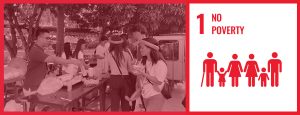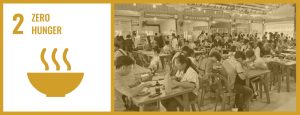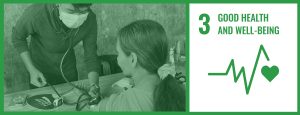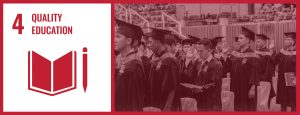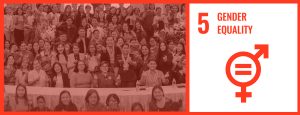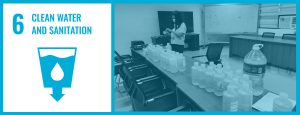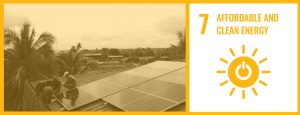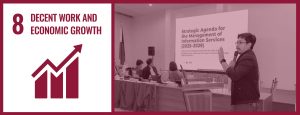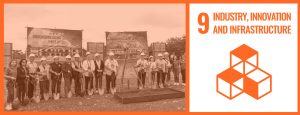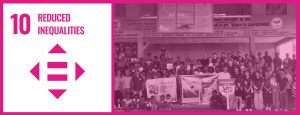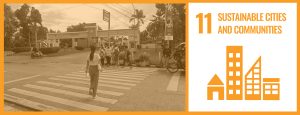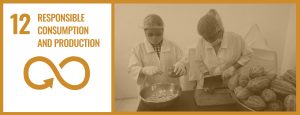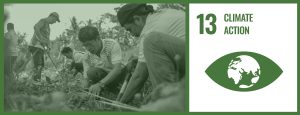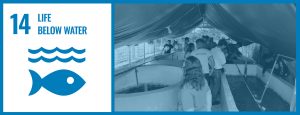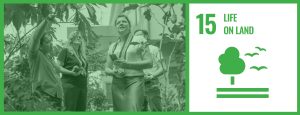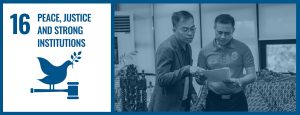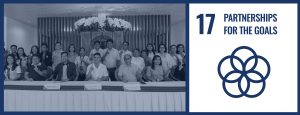2024 Research | SDG 11 – Sustainable Cities and Communities
Research Programs
The Credit Risk Management of Agricultural Cooperatives in Isabela Province during the COVID-19 Pandemic
Proponent: Fler L. Madayag
Abstract
Cooperatives are an integral part of the economic framework. They are an important source of finance for people and companies of all kinds, acting as a safety net for savings. During the period of Covid-19 pandemic, these coopeartives are exposed to credit risk. Since implementing risk management techniques are expensive, cooperatives have found it difficult to mitigate credit risk, which might lead to a spike in deliquency rates and cause issues for the cooperatives’ financial position. This study, which combined qualitative and quantitative methods, examined the cooperative’s exposure to credit risk, its effectiveness in implementing credit risk management strategies, and the challenges that these sixteen agricultural cooperatives in Isabela encountered in mitigating credit risk. A four-point Likert scale survey questionnaire, an open and closed-ended interview questionnaire, and information from financial statements and annual reports were used to collect data. The study’s findings revealed that agricultural cooperatives in Isabela are exposed to low level of credit risk. It also showed that a broad spectrum of activities,including identification, evaluation, and mitigation, had been implemented to reduce credit risk. Furthermore, even if the majority of cooperative still face various challenges in implementing risk management.
Closer Look to Explore the Knowledge, Skills & Attitudes (KSA) on the Faculty Community Engagement of the College of Business, Accountancy & Public Administration (CBAPA) Isabela State University Echague, Isabela Study: Knowldege of Community Service
Proponents: Amie G. Bala, Ralliegh F. Vizcarra, Jayson G. Gollayan, Vivian M. Dumrique
Abstract
This study develops a framework for assessing community service knowledge among faculty extensionists in the College of Business, Accountancy & Public Administration (CBAPA) at Isabela State University. Recognizing the critical role of community service in higher education, the research identifies gaps in faculty engagement and effectiveness, exacerbated by a disconnect between theoretical knowledge and practical application. The study employs a mixed-methods approach to explore the current level of knowledge among faculty regarding community needs, environmental awareness, and effective extension practices. key objectives include defininf essential knowledge components and assessing personal perspectives on community service initiatives. Findings reveal that faculty often struggle with understanding local cultural dynamics, which impedes their effectiveness. the study recommends targeted training programs and structural support to enhance faculty engagement in community service. The developed framework aims to foster sustained community partnerships, ensuring faculty are equipped to meet evolving community needs. This approach is vital for promoting deeper commitment to community engagement within academic institutions, ultimately contributing to the development of responsive community service initiatives.
Closer Look to Explore the Knowledge, Skills & Attitudes (KSA) on the Faculty Community Engagement of the College of Business, Accountancy & Public Administration (CBAPA) Isabela State University Echague, Isabela Study: Core and Soft Skills
Proponents: Amie G. Bala, Ralliegh F. Vizcarra, Exequiel M. Perez, Rolly L. San Jose
Abstract
This study explores the role of core and soft skills in enhancing the community engagement of faculty members at the College of Business, Accountancy, and Public Administration (CBAPA) at Isabela State University. Faculty involvement in extension activities is crucial in bridging academic knowledge and local community needs. However, there is a gap in understanding the competencies that contribute to impactful community engagements. This research evaluates the proficiency of CBAPA faculty in critical knowldege areas such as communication outreach. Utilizing a mixed-method approach, the study assesses the faculty’s motivation, collaboration efforts, and institutional support to develop a conceptual framework aimed at fostering sustained and meaningful community involvement. Findings suggest that while faculty members demonstrate strong communication and collaboration skills, there is room for improvement in technological proficiency and problem-solving. The study underscores the need for targeted faculty development programs to enhance both core and soft skills, thereby promoting a more structured and effective approach to community engagement. The outcomes provide insights into designing professional development initiatives that align faculty competencies with the demands of community extension activities.
Closer Look to Explore the Knowledge, Skills & Attitudes (KSA) on the Faculty Community Engagement of the College of Business, Accountancy & Public Administration (CBAPA) Isabela State University Echague, Isabela Study: Attitudinal Traits, Challenges and Supports
Proponents: Amie G. Bala, Leah B. Bitao, Norvelyn B. Bautista, Maroflor M. Devibar
Abstract
Community engagement is a critical aspect of higher education, facilitating the connection between acadmeic institutions and their surrounding communities. This studyaims to develop a comprehensive framework that examines the attitudinal traits, challenges, and support systems influencing the effectivess of faculty extensionists at the College of Business, Accountancy, and Public Administration (CBAPA) of Isabela State University. Key Attitudinal traits such as adaptability, collaboration, and accountability were explored alongside challenges like resource limitations, bureaucratic barriers, and post-pandemic restrictions. The study utilized a mixed-method approach, inciporating structured questionnaires and thematic analysis to assess faculty experiences and the support mehanisms available for community engagement. Results highlight the importance of internal and external linkages, as well as institutional support in enhancing faculty efforts. By identfying the traits, challenges, and supprt systems that shape faculty extensionists’ experiences, thi research provides valuable insights into improving community engagement practices within academic settings.
“Road Users’ Competency and Traffic Law Awareness: An Input to Higher Education Institutions (HEIs) Road Users Safety Education and Intervention Program”
Proponents: Ronie G. Torres, Philmark M. Dalit, Ferdinand N. Pajarillo and Robielyn O. Bartido
Abstract
This study investigates the role of Higher Education Institutions (HEIs) in enhancing road safety through education and awareness of traffic laws and driving competencies among young drivers and to support the UN’s goal of providing safe and sustainable transport systems, particularly for vulnerable road users, that despite of being influential in sustainable development, research on universities contributions to transportation-related goals is limited. A survey was conducted using a questionnaire, patterned from the Filipino Drivers’ Manual (FDM) and TESDA Training Regulations (TR) to assess the demographics, driving experience, traffic law awareness and competency of students. Results of the study showed that the predominantly young, male population with many novice drivers lacking formal instruction, which correlated with reported driving violations. The analysis indicates that driving experience significantly enhances awareness of traffic laws, while demographic factors have minimal impact on competency. Recommendations include developing targeted driver education and intervention programs, launching awareness campaigns, and involving parents and teachers to reinforce safe driving habits. Further research is suggested to explore various factors influencing awareness and competency.
Keywords: competency, land transportation, higher education, road users, traffic
Empowering Communities: Design,Fabrication, and Evaluation of Mobile Solar-Powered Charging Stations with Integrated Street Lighting and Automated Water Refilling Station for Disaster Resilience
Proponents: Jolan Baccay Sy, Jake La Madrid, Allen M. Paz
Abstract
This study investigates the design, fabrication, and evaluation of mobile solar-powered charging stations integrated with street lighting and automated water refilling systems, aimed at enhancing disaster resilience in rural communities, particularly at the Cabagan Riverside Evacuation Center. The primary objectives were to address energy and water accessibility challenges during natural disasters, develop functional designs for diverse community needs, and utilize sustainable materials for durability.
The innovative approach combines solar-powered charging, street lighting, and automated water refilling into a single mobile unit. Engineered to provide essential energy, lighting, and water access for one week in disaster-affected areas, the station features a lightweight frame, high-efficiency solar panels (330 watts), and a 100Ah battery. Multiple USB ports facilitate device charging, while integrated LED lighting enhances nighttime safety. The automated water refilling system employs ultrasonic sensors and an Arduino microcontroller for efficient water dispensing. Evaluation through a structured questionnaire revealed significant improvements in energy access and safety, with high satisfaction among community members. This study underscores the potential of solar-powered solutions to strengthen disaster resilience and promote sustainability in vulnerable regions, offering valuable insights for policymakers and practitioners in disaster management.
Development of an Automated Solar (Autosolar)Powered Biowaste Processing Machine
Proponents: Michelle Ann M. Calubaquib,Ph.D., Engr. Jolan B. Sy, Engr. Jake D. La Madrid, Engr. Samuel R. Simon, Ambrose Hans G. Aggabao, Ph.D.
Abstract
This research focused on the design, optimization, and integration of a biowaste processing machine, or biodigester, and a 16 kW solar photovoltaic (PV) system to create a sustainable and efficient solution for converting agroforestry waste into compost. The biodigester operates through aerobic decomposition, utilizing a control system that monitors and regulates temperature, humidity, and soil moisture to ensure efficient compost production. This system includes sensors, a microcontroller, and a Human-Machine Interface (HMI) for real-time monitoring and control. The mobile 16 kW solar PV system, comprising 18 high-efficiency monocrystalline panels, converts sunlight into electricity, which is then optimized and stored using a Deye inverter and a high-capacity lithium battery managed by a Battery Management System (BMS) and active balancer.
The successful integration of the biodigester and solar PV system resulted in a mobile biowaste processing unit capable of converting agroforestry wastes into organic fertilizers. The system’s mobility, flexibility, and reliance on solar energy ensured efficient and sustainable operation. Key findings included the production of compost with significant nutrient content (1.68% nitrogen, 0.14% phosphorus, 2.16% potassium, pH 7.12) when using a compost activator, maturing in 20 days. Compost without the activator had higher nitrogen and phosphorus but lower potassium content, maturing in 25 days. This study highlights the benefits of integrating renewable energy with biowaste processing technologies, promoting sustainable agricultural practices and reducing environmental impact.
Soil Quality Assessment in Masipi East, Cabagan, Isabela, Philippines: An Input for S&T Based Gmelina (Gmelina arborea Roxb.) Plantation Establishment
Proponents: Emerson V. Barcellano, Bondee L. Peñaflor, Rocel S. Galicia, Adona Joana S. Urmeneta
Abstract
Soil analysis provides information necessary to set nutrient application targets and allow monitoring and detection of changes in soil parameters with time. This study aimed to determine the quality of soil in the farmlands of upland communities in Cabagan, Isabela.
Soil samples derived from pre-identified sites were collected following standard procedures and the analysis was done at the laboratory of the Department of Agriculture. Results show that the average pH of the 15 sites was 5.46 which is moderately acidic. Meanwhile, in terms of the concentration of organic matter (%N), the lowest (0.96) was recorded at Plot #5 while the highest (2.30) was recorded at Plot #1. The average O.M % (N) was 1.76 which is also classified under moderate level. As to the Phosphorus concentration (ppm), the lowest (2.8) was recorded at Plot #1 while the highest (14.4) was recorded at Plot #6 with an average concentration of 9.59 ppm which is classified as low in terms of soil requirement for an effective and efficient crop production system. The lowest recorded level of concentration of Potassium is at Plot #2 while the highest is at Plot #8 with mean concentration of 184 ppm classified as moderate. On the other hand, these sites are classified low in terms of Zinc concentration with 0.04 ppm at Plot #4 while 0.48 ppm (the highest) at Plot #8 and a mean concentration of 0.17 ppm.
The findings necessitates the need for: documenting actual production of local farmers and estimate the profitability of their existing production operations; interventions to inform the local farmers on the results of the analysis and identify the appropriate technical approaches to be introduced with the farmers; and ensuring the compliance to the recommendations of DA-CVIAL in terms of the fertilizer applications and appropriate crops to be planted.
Keywords: Soil, Soil Quality, Soil Quality Assessment, Database
Enhancing Graduate Job Concordance Tracking with AI-Based Matching Algorithms
Proponents: Mark Gil T. Gañgan 1 and Jhoan V. Paguirigan
Abstract
The web-based Graduate Job Concordance tracking system, utilizing AI-based matching algorithms, serves as an an innovative platform for assessing the relevance of employment secured by BSIT graduates in relation to their academic qualifications. This study employs an Iterative Software Development Methodology alongside a Text Mining Model to create the platform, which integrates matching algorithms to facilitate effective job relevance assessment. The text mining model offers a structured approach for preprocessing, transforming, and classifying job titles through machine learning algorithms. The front-end of the platform is developed using HTML, CSS, and JavaScript, while the back-end is powered by PHP and MySQL, ensuring a robust and user-friendly interface. This choice of technology underscores the platform’s cost-effectiveness, leveraging open-source tools that offer customization flexibility and access to a wealth of support and expertise.
The research presents a novel solution that bridges the gap between higher education institutions and the ever-evolving employment market. By harnessing AI technology, particularly through the implementation of three text analysis algorithms—Cosine Similarity, Euclidean Distance, and Jaccard Similarity—the study identifies the Cosine Similarity algorithm as the most effective for determining job concordance among BSIT graduates. To evaluate the system’s performance, respondents assessed it against the ISO 25010 standards, focusing on functional suitability, usability, and reliability. The system achieved an impressive overall rating of 4.36, indicative of a “Strongly Agree” consensus among users. Ultimately, this study contributes to the enhancement of academic programs, aligning them more closely with industry needs. Furthermore, it equips educational institutions, accreditation agencies, and policymakers with data-driven insights for informed decision-making, ultimately benefiting both students and the broader industry landscape.
BotCoin: Bottle-Coin Vendind Machine
Proponents: Kelvin Kris C. Gonzales, Alvin B. Tañeza
Abstract
BotCoin: Bottle-to-Coin Vending Machine is a technological solution designed to alleviate the growing issue of plastic and can waste in San Mateo, Isabela, Philippines. This clever vending machine converts throwaway bottles/cans into cash, encouraging residents to recycle and promoting environmentally friendly activities. BotCoin aims to make recycling more accessible and engaging by combining technology and financial incentives, particularly among younger generations who are more likely to respond to tech-based solutions.
However, numerous challenges and issues have emerged in waste segregation practices in many communities. In recent years, local government has noticed an alarming rise of plastic bottles/cans garbage in public places, rivers, and landfills. Despite various environmental awareness programs, plastic recycling rates are still low, and inappropriate disposal contributes to environmental damage. Furthermore, the lack of a formal waste management system and readily available recycling programs makes it difficult for residents to actively participate in plastic trash reduction.
The increasing prevalence of plastic bottles and cans in the Philippines, despite existing waste management policies, highlights a significant challenge in environmental sustainability. The country is grappling with a substantial volume of plastic waste, with Quezon City alone generating approximately 262 tons of plastic waste daily, indicative of broader national trends (Sidhu et al., 2021). The Philippines ranks as the third-largest contributor to global mismanaged plastic waste, following China and Indonesia, which underscores the urgency of addressing this issue through effective waste management strategies (Deocaris et al., 2019). Despite the enactment of the Ecological Solid Waste Management Act of 2000 (Republic Act 9003), which aims to enhance waste management practices, the effectiveness of these policies remains questionable. A study indicates that the lack of public awareness and inconsistent policy implementation are critical barriers to successful waste management (Chen et al., 2021).
With this, the BotCoin vending machine provides a localized, small-scale solution that is both inexpensive and feasible for rural areas such as San Mateo, Isabela. This innovation also addressed the gaps to other researches on incentivized recycling systems in developing countries, where economic and infrastructure constraints frequently impede effective waste management techniques. This also represents a transformative approach to recycling and waste management, aligning individual and collective interests. It empowers individuals to contribute to a sustainable future while earning rewards for their actions. As more of these innovative machines will soon populate our towns/cities, we can look forward to a world where recycling pays dividends for both our wallets and our planet, making the Earth greener and wealthier, one recyclable at a time.
Enhancing the Basic Services on the Implementation of Sustainable Development Goals: The Municipality of San Mateo Case
Proponents: Rosalie C. Leal, Venus A. Diego
Abstract
The paper examines the role of Local Government Units (LGUs) in providing quality basic services in accordance with the United Nations’ Sustainable Development Goals (SDGs), specifically in the municipality of San Mateo, Isabela. The study seeks to confirm their accomplishments by evaluating the execution of fundamental services in accordance with the Sustainable Development Goals (SDGs). It concentrates on certain Sustainable Development Goals associated with agriculture, infrastructure, health, environmental management, tourism, education, and social services, highlighting the interaction between political and governance frameworks.
The study evaluates fundamental services, the integration of Sustainable Development Goals (SDGs), levels of satisfaction, and disparities among respondent groups, while proposing improvement initiatives. Results indicate significant integration and favorable evaluations, demonstrating a dedication to global sustainability. San Mateo’s distinguished status and multiple accolades highlight its dedication to the Sustainable Development Goals (SDGs). This research concludes that San Mateo delivers services equally, emphasizing inclusivity and equality. The affirmative association between integration and satisfaction underscores the significance of aligning services with sustainable development concepts. Recommendations encompass ongoing enhancement, needs assessments, periodic evaluations, community satisfaction surveys, adaptive action plans, and a specialized monitoring division. The study adds to what is known about sustainable development in local government by showing how integration, satisfaction, and the success of implementing the SDGs in LGU San Mateo are all connected.
Gastronomic Heritage Awareness: The Knowledge of BS Hospitality Management Students of ISU-Cauayan Campus on the Culinary Traditions in Kakanin-Making of Isabela
Proponent: Dr. Karla Jastine C. Maramag
Abstract
The purpose of this study is to investigate the level of awareness among BS Hospitality Management students at ISU-Cauayan Campus on the culinary traditions of kakanin-making in Isabela, which are an important part of the province’s culinary heritage. The study intends to examine students’ understanding of the origins, names, taste and appearance and traditional preparation methods of numerous kakanin products, as well as identify challenges to conserving these culinary practices. A mixed method approach was used in this study and Hospitality Management students were randomly selected as participants. Data were collected from student participants through questionnaires and open-ended questionnaires, and their knowledge was analyzed depending on key factors such as gender, year level, and length of residency. Results show that participants are aware of the Gastronomic heritage of kakanin products in the province in terms of their origin, names, taste and appearance and its culinary techniques and methods. The study also highlights several challenges, such as the changing trends, loss of interest, time-consuming preparation process, the lack of traditional knowledge and equipment, which pose risks to the preservation of these culinary traditions. The findings of this study can help improve the level of awareness of gastronomic heritage of the students by integrating it into the BSHM curriculum, helping to fill knowledge gaps in traditional preparation methods. Additionally, organizing cultural festivals and food fairs focused on kakanin can further showcase these culinary traditions. And using the internet to create accessible online resources about traditional kakanin-making will also support learning and encourage engagement with this essential aspect of culinary heritage.
Waste-Wise Cities for Sustainability: Establishment of a Material Recovery Facility for Waste Reduction Management and Promotion of Circular Economy
Proponents: Dr. Precila C. Delima, Dr. Lorelei C. Tabago, Dr. Marisol S. Foronda, Dr. Teresita C. Molano, Dr. Jonathan Lord R. Aquino
Abstract
The project, Waste Wise Cities for Sustainability: Establishment of a Material Recovery Facility (MRF) in Cauayan City, addresses the pressing need for sustainable waste management solutions in response to rapid urbanization and increased waste generation. The MRF aims to reduce landfill dependency, mitigate pollution, and contribute to a circular economy by promoting waste recovery and resource reuse. Through a mixed-method approach, this study evaluates the MRF’s quantitative viability, including waste composition analysis and financial feasibility via metrics such as Return on Investment (ROI) and Net Present Value (NPV) and Payback Period (PP). Qualitative interviews reveal strong community support, highlighting anticipated benefits in job creation, environmental health, and waste awareness. Key findings indicate that the MRF can achieve financial sustainability by incorporating additional revenue sources, such as compost sales and partnerships with local businesses. The project aligns with Sustainable Development Goals (SDGs) positioning the MRF as a replicable model for regional waste management and a catalyst for sustainable urban development.
Knowledge, Attitudes and Practices Towards Water Sanitation and Hygiene among Household Residents in Flash Flood Prone Areas in the City of Cauayan, Province of Isabela, Northern Philippines
Proponents: Paul Angelo A. Tamayo, Marisol S. Foronda, & Lorelei C. Tabago
Abstract
This study explored the knowledge, attitudes, and practices towards Water, Sanitation, and Hygiene (WASH) among households in flash flood-prone areas of Cauayan City, Isabela, Philippines. Given the susceptibility of the area to flash floods, investigating their KAP in WASH is crucial in preventing disease outbreaks. A cross-sectional, non-experimental research design was used and 100 household members were selected through purposive sampling from selected barangays. A questionnaire adapted from UNICEF to obtain information on hand washing, solid waste management, sanitation, and treatment of drinking water. Findings revealed that most households understand key handwashing practices is washing hands before eating with 91.59%. However, knowledge gaps exist regarding hand hygiene before breastfeeding and water treatment. While most respondents use latrines, open defecation persists among children under five. Additionally, waste management practices and reliance on external water sources present concerns, especially during floods. The study underlines the need for the provision of an enhanced flood preparedness plans focusing on improving WASH practices and infrastructure, particularly in vulnerable communities. Recommendations include increasing outreach and education efforts and improving sanitation systems to mitigate health risks in flood-prone areas.
Designing and Construction of Posture Brace Integrating Backpack Functionality
Proponent: Ronald B. Isidro Jr
Abstract
This paper explores the design and construction of a posture brace with integrated backpack functionality. The device is intended to correct posture and reduce the risk of back pain while also serving as a functional, everyday backpack. This dual-purpose solution is aimed at students and professionals who carry heavy loads, seeking to improve spinal alignment and reduce the strain on muscles. Prototyping and testing demonstrate that this design offers significant ergonomic advantages over traditional backpacks.
Design and Production of Abdominal Brace Contraption Merged with the Function of Utility Apparel
Proponent: Ronald B. Isidro Jr
Abstract
The researcher explored the design and production of an abdominal brace integrated with utility apparel functionality. The aim of the research is to create a contraption that not only provides abdominal support but also incorporates practical storage solutions, enhancing convenience for users who require additional physical support. Prototyping and evaluation of the product indicate the potential of such hybrid designs to improve both health and productivity in daily life.

